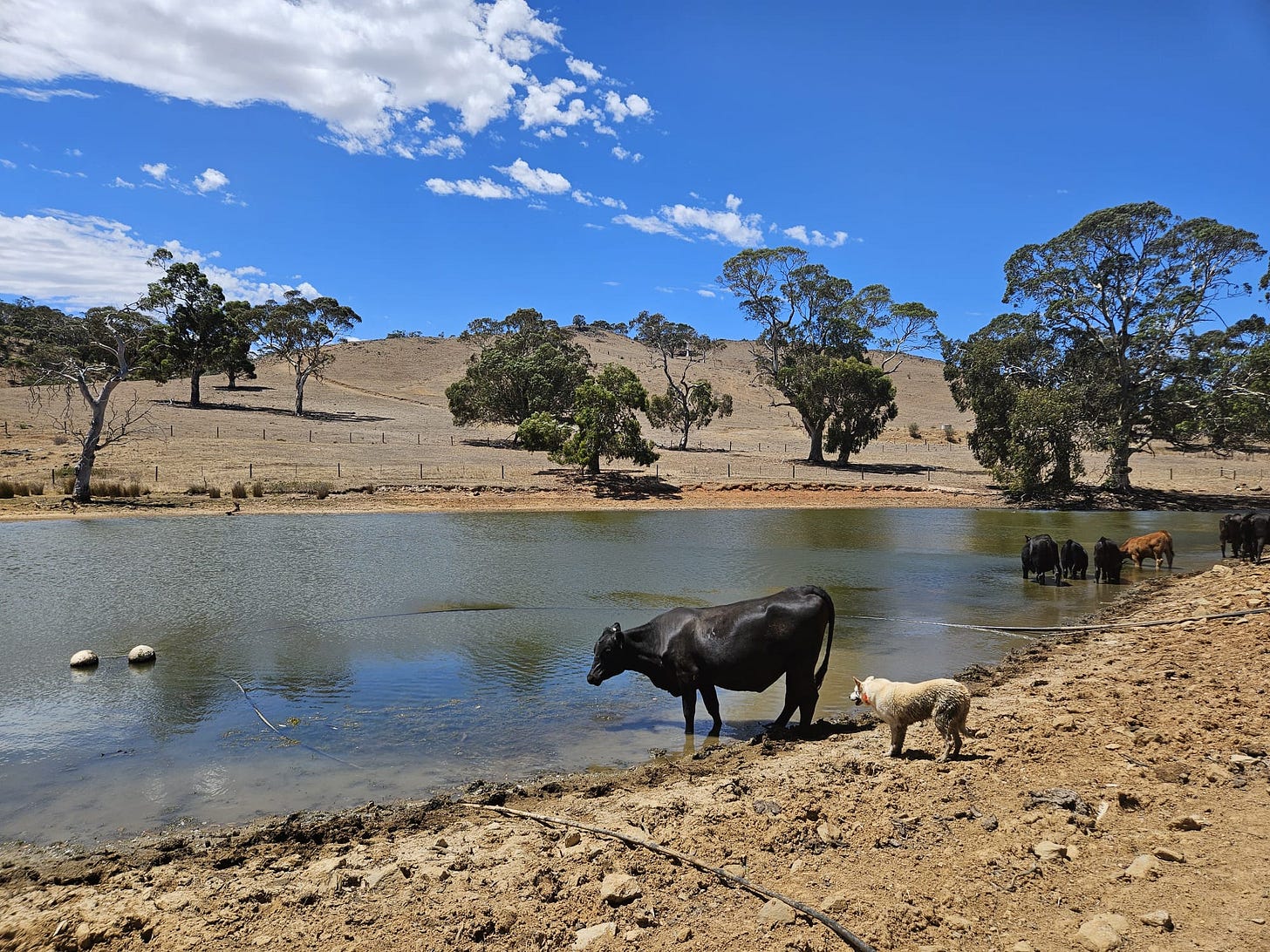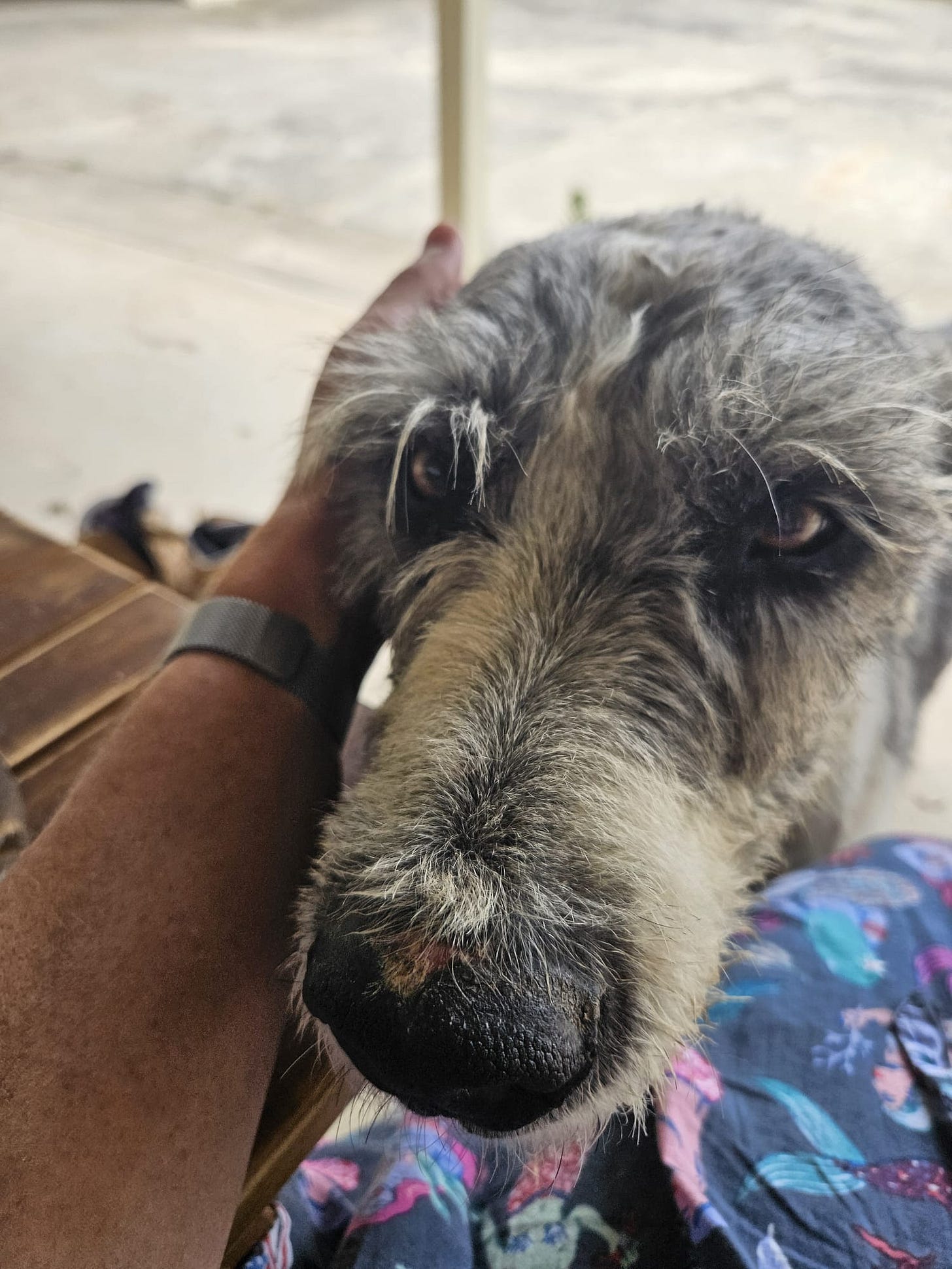A Home in the Hills
Highlights of a farm stay in Adelaide
The place is dusty. Underfoot, the dry ground is a pale Dijon colour in the hollow around the lake, shading into a greyish beige as it ascends the hill. A friend describes it as the colour of a well-loved teddy bear. The cattle are wading at the edge of a large pond: the cows have glossy black and chestnut flanks. At generous intervals, the land is dotted with trees: the eucalypts here are majestic: their bark is peeling off in swirls, in long, slender corkscrew ribbons of every pastel shade between cream and orange: pale ginger, honey, sandstone, almond. Two dogs run at our feet and my hostess, slender and agile—girlish from behind—wearing a jaunty hat, has the comfortable stride of a long-time farmer. A wolfhound—his enormous head around the size of Cookie our shihpoo’s entire body—waits obediently at a gate for us to squeeze past him and then, at his owner’s command, bounds away.
The air is bright, dry and clear. It’s hot now, but has the unmistakeable feel of somewhere that will be crisp in winter. We walk up to the property line at the top of a small hill and look down at a patchwork of fields. The more distant hills form an undulating line and are greyish violet in the sun. Although I know that novel was set elsewhere—in northern New South Wales—I can’t shake the feeling of being inside the pages of The Thorn Birds. That book stamped the image of life on an Australian farm onto my imagination with such force that reality itself can't
displace it. I expect a handsome priest to come loping up the hill at any moment.
There are tomatoes, peas, and squash in a fenced-in kitchen garden and kalamata olive trees out front. The farmhouse lawns are a miniature oasis of bright, though patchy, green. A veranda encircles the bedrooms, lined with the fanned-out stalks and white and lilac blossoms of agapanthus flowers. Against the muted beige and browns of the country, it's a miniature oasis. Hopping around by the hedgerow are fairy wrens, the males decked out in their fluorescent turquoise, lapis lazuli and royal blue. Behind the garage, by a tractor, sheep snuffle at my legs and I pat them gingerly—I'm a city slicker me, unused to farm animals. The summer evenings are long and—this is the blessing of a drier climate—mosquito free. We sit out at a broad wooden table where I am regaled—there really is no better word for it—with eggs and lamb and herby salads and potatoes all grown or raised on the farm. Flock after flock of parrots cross the sky: pink and grey galahs, snow-white corellas, and the lovely scarlet, navy and lime rosellas.
My hosts both spent most of their lives in Alice Springs and the place seems oddly near. I gather from my history books that what is now the Northern Territory used to belong, counterintuitively, to South Australia and the state gave up its claim on condition that a railway be built to link Darwin to Adelaide, across the desert. The connection between north and south was a theme of my stay. I leafed through the heavy card pages of an old photo album full of evocative black-and-white prints of ladies in safari clothes next to single-propellor planes on tiny airstrips. I heard stories of my host's grandmother (if I remember correctly) repeatedly making the long journey from Alice to Adelaide to give birth and returning with one new-born after another: in the early years, by horse and buggy—a jolting three weeks of enduring scorching heat in summer and bivouacking in subzero temperatures in winter—and then by train.
The wolfhound lives outside. As instructed, on my first day, I quietly ignored him. He walked along besides me, never quite touching and I resisted the temptation to stretch out a hand to pet him. Then, one morning, as I emerged from my room, I saw him standing at the door, face close to the glass, looking straight at me and wagging his tail. “I think he’s ready for you now,” my hostess told me. I sat down just outside the entrance in a small wooden chair and immediately a giant head laid its weight upon my lap and a pair of soulful amber eyes gazed up at me from behind straggly grey eyebrows. Few things give me such intense, unmitigated pleasure as the feeling of stroking a dog. It’s a joy that never pales, can’t be lessened by habituation. I don’t have to be in any particular mood, I can be energetic or exhausted, it requires no effort, no focus, it never becomes boring. It’s just immersive pleasure in its purest form. The moment when the wolfhound laid his head on my thigh was the high point of ten days in Adelaide for me.
Another highpoint is a riverside walk in a nearby town. With its neat high street and brick churches, its decorous park overlooking tasteful suburban residences, the place reminds me of Scotland. (I later learn that this feeling is unsurprising, given its Scottish immigrant history). But dotted about on lawns industriously pecking at the grass and peeking out at me from cozy perches in the crooks of tree branches are birds you’ll never find in Scotland—corellas (Cacatua sanguinea). Squat white parrots with a lopsided oval of wrinkly grey-blue skin around each eye accented by a patch of raspberry feathers, like a child’s drawing of a bird’s eye, as if they had stick-on plastic googly eyes, pressed in with a sticky, jam-stained toddler’s finger. Their squawk is quieter, more querulous than that of a cockatoo, like the sound of an ageing coloratura soprano. Their kinship with their dinosaur ancestors is palpable: they are a dino’s goofy grandkids.
I follow a narrow path down to the river, a sliver of water fringed by the familiar shrubby, droop-leaved eucalpytus trees. The air is filled with the corellas’ cries, like a string section played by an orchestra of madmen, all scraping away at once. The only other sound is my own sandals slapping against the path, which has widened into a paved cycle track as the river recedes away to my left. Australia’s chaotic feathered air squadrons scatter at my approach. As I pass each tree, dozens of them are startled into flight—away from, towards me, in every direction—some swooping seemingly right at me, but veering off at the last moment, as if I were in a comic remake of Hitchcock’s The Birds. They rise up in shreds of white, like goose feathers from a giant pillow fight.
Australia everywhere has this deep, comforting cultural homeliness—it’s home, just shifted over slightly. The Aussie accent is recognisably a British accent, a blend of British accents, the vowels ever so slightly adulterated and with a bit of alveolar flapping added just for fun. And the Aussie culture is recognisably British culture, mutated in adaptation to a new ecological niche. It’s like the difference between Marmite and Vegemite. The Australian rendition of that thick black paste has a touch of fruitiness absent from the original, a few additional notes of celery salt and herbs, a greater user-friendliness (the Aussies added more oil to make it easily spreadable, where Marmite’s stubbornly thick texture always threatens to rip one’s toast). But who could like Marmite or its Vegemite cousin without deep roots in the UK?
And whenever I stay with people, I like to fantasise that I live there permanently. Here, nestled in the Adelaide Hills, I am with people whose environment, home and manners all bear testimony to rich lives, well lived—the kind of lives that can only be gradually built, year by year and decade by decade, through relationships long nurtured, consistent hard work, wise decisions, deep connections to people and places fostered carefully, maintained with effort. When someone recently learned that I don't have a place of my own, that I board with friends, he asked, “What happened? Was there some crisis in your life that led to this?” There was no crisis: just many unwise decisions and a life lived in stages, in a variety of countries, pursuing a few different careers, none of them successful enough to sustain me for too long.
I lack that rich texture of personal life: I don’t have the photo albums or the childhood friends (at least, not within easy distance), the decades-long marriage, the heirlooms or the real estate or the investment account—for reasons that are largely my own fault. But what I do have—and I feel it acutely when I’m visiting people as interesting, as intelligent, as warm as this couple—is a miraculous ability to feel at home anywhere. To feel, these are my people, even if we grew up on opposite sides of the globe. And if this had been my life, it would have been a happy one. I’m never homesick because here, at the bottom of the world, everywhere I go feels like home.




Thanks, Iona, I love this kind of writing - Best wishes as always - Rob